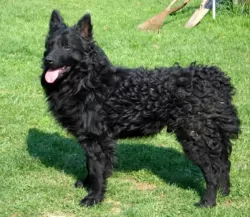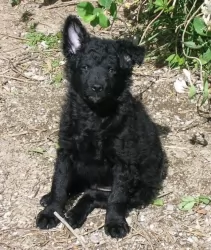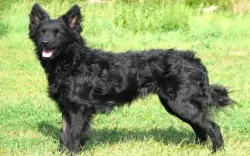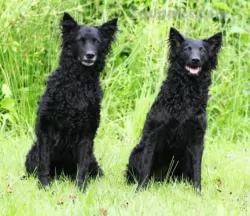 MyDogBreeds
MyDogBreeds Croatian Sheepdog is originated from Croatia but Briard is originated from France. Croatian Sheepdog may grow 16 cm / 6 inches shorter than Briard. Croatian Sheepdog may weigh 20 kg / 44 pounds lesser than Briard. Croatian Sheepdog may live 3 years more than Briard. Croatian Sheepdog may have less litter size than Briard. Croatian Sheepdog requires Moderate maintenance. But Briard requires High maintenance
Croatian Sheepdog is originated from Croatia but Briard is originated from France. Croatian Sheepdog may grow 16 cm / 6 inches shorter than Briard. Croatian Sheepdog may weigh 20 kg / 44 pounds lesser than Briard. Croatian Sheepdog may live 3 years more than Briard. Croatian Sheepdog may have less litter size than Briard. Croatian Sheepdog requires Moderate maintenance. But Briard requires High maintenance
 Known also as Hrvatski Ovkars, the black Croatian Sheepdog has been in Croatia since the 7th century already. He was brought to the region by Croats who wanted a strong working dog.
Known also as Hrvatski Ovkars, the black Croatian Sheepdog has been in Croatia since the 7th century already. He was brought to the region by Croats who wanted a strong working dog.
Over the centuries, the dog hasn’t changed much in looks, and in 1935 a breeding program for the dog was developed. A certain Dr. Romic started the program with 3 dogs, and the work he did with the dogs saw that the Croatian Sheepdog got official recognition a few decades later.
In March 1968, the Yugoslav Kennel Club adopted the breed standard, and since then, several kennels recognize the Croatian Sheepdog. The dog is still not known particularly well outside their own county, but in Croatia it is essentially known as a companion dog.
 Through myth and legend, the Briard is thought to be a very ancient dog. A French herding breed, a Briard type of dog appears in writings as early as the end of the 14th century. According to legends the Briard was owned by Napoleon, Charlemagne, Lafayette and Thomas Jefferson. As a cross between the Barbet and the Beauceron, the Briard came into popularity following its appearance in a Paris dog show in 1863. Bred originally to guard and herd sheep, these intelligent, independent dogs were often left on their own. Because they both guarded and herded, their size and structure as well as their personalities were different from other dogs that worked sheep. Those that herded only were fast, agile and smaller. Those that only guarded were heavier, bigger and stronger. The Briard was in-between these two types of breeds. He was well suited to any kind of farm work and guarded the crops from the sheep’s desire to eat them. They moved the sheep from one grazing area to another and then to their holding area at night. No humans had to assist the Briard in this work once they were trained.
Through myth and legend, the Briard is thought to be a very ancient dog. A French herding breed, a Briard type of dog appears in writings as early as the end of the 14th century. According to legends the Briard was owned by Napoleon, Charlemagne, Lafayette and Thomas Jefferson. As a cross between the Barbet and the Beauceron, the Briard came into popularity following its appearance in a Paris dog show in 1863. Bred originally to guard and herd sheep, these intelligent, independent dogs were often left on their own. Because they both guarded and herded, their size and structure as well as their personalities were different from other dogs that worked sheep. Those that herded only were fast, agile and smaller. Those that only guarded were heavier, bigger and stronger. The Briard was in-between these two types of breeds. He was well suited to any kind of farm work and guarded the crops from the sheep’s desire to eat them. They moved the sheep from one grazing area to another and then to their holding area at night. No humans had to assist the Briard in this work once they were trained.
During World War 1, the Briards were drafted into service as messengers, sentries and search dogs for lost or injured soldiers. In that time frame the breed served almost to the point of extinction. Breeding programs following the war brought them back. Today the Briard is a home companion, a police dog, as well as both military and civilian search and rescue dogs.
 The Croatian Sheepdog is a medium sized, muscular dog which stands roughly 40 – 53cm at the withers and weighs 13 to 20kg. The head is wedge shaped and lean and he has brown to black colored eyes.
The Croatian Sheepdog is a medium sized, muscular dog which stands roughly 40 – 53cm at the withers and weighs 13 to 20kg. The head is wedge shaped and lean and he has brown to black colored eyes.
The triangular-shaped ears are medium sized and semi-erect or erect. The tail of the dog is often docked, but if not it is set high and is inclined to curl over the back.
The dog is nearly always black although you’ll find a few white hairs on the throat or chest or on the legs and toes. The double coat is of medium length, being wavy or even slightly curly.
The Croatian Sheepdog is an athletic, alert dog and he has high energy levels, loving to be put to work or to be busy with one or other activity. He fits in well as a family pet and gets on well with children and pets in the home, but he is going to need plenty of exercise and games.
This particular dog won’t do well with a family of couch potatoes as he craves lots of activities. He will certainly benefit from training and socialization, and because he is intelligent he learns easily and then he is obedient and ready to please.
He is a dominant, confident dog who thrives on attention from his human family. He isn’t a dog you can just stick in the backyard as he is social and craves activity and attention. He is wary of strangers and makes an excellent watchdog.
 The Briard is a powerful, intelligent and independent working dog. They have a straight topline and their height is almost the same as their length. They have long, large, rectangular heads with wide muzzles. Their noses are also square and jet black while their side set, large eyes can be black-brown or black. Their ears have traditionally been cropped but with more countries outlawing it, they can now have natural ears set high on the head. They have a tail that is feathered and low-cut. The feet of a Briard are round, compact and large.
The Briard is a powerful, intelligent and independent working dog. They have a straight topline and their height is almost the same as their length. They have long, large, rectangular heads with wide muzzles. Their noses are also square and jet black while their side set, large eyes can be black-brown or black. Their ears have traditionally been cropped but with more countries outlawing it, they can now have natural ears set high on the head. They have a tail that is feathered and low-cut. The feet of a Briard are round, compact and large.
The Briard is a double coated breed with a long beard and mustache. Their hair completely covers the head and the eyes so that they are not seen. They have prominent eyebrows as well.
 The Croatian Sheepdog isn’t a demanding dog, although he will be relying on you to give him plenty of exercise. He wants to please and will fit into life in the city or life in the country, so long as he gets regular exercise.
The Croatian Sheepdog isn’t a demanding dog, although he will be relying on you to give him plenty of exercise. He wants to please and will fit into life in the city or life in the country, so long as he gets regular exercise.
It doesn’t take much to keep the Croatian Sheepdog happy and content, and when he thrusts his wet nose into your hand and you see his wagging tail, you’ll know its all been worth it to give this pet the best as he gives you his undivided love and loyalty.
 As mentioned previously the Briard is intelligent and independent. They are also loyal, rugged, protective and bond intensely with their humans. They are often aloof when it comes to strangers or even when new furniture is introduced into the household. They have to learn that anything new into the family environment is friendly and good. They are great with children and susceptible to separation anxiety because of their deep affection for their people. Socialization for puppies is a must. This will let them know that people and children, other dogs in general are not harmful to their families. They have great memories and once they learn something – right or wrong – it is almost impossible to change it. They were bred to be independent thinkers who acted on their own conclusions. This is still true of the breed today, making them appear to be stubborn.
As mentioned previously the Briard is intelligent and independent. They are also loyal, rugged, protective and bond intensely with their humans. They are often aloof when it comes to strangers or even when new furniture is introduced into the household. They have to learn that anything new into the family environment is friendly and good. They are great with children and susceptible to separation anxiety because of their deep affection for their people. Socialization for puppies is a must. This will let them know that people and children, other dogs in general are not harmful to their families. They have great memories and once they learn something – right or wrong – it is almost impossible to change it. They were bred to be independent thinkers who acted on their own conclusions. This is still true of the breed today, making them appear to be stubborn.
They are great watchdogs, fearless and brave; willing to learn, eager to make you happy. They are basically gentle but that always runs up against their protective nature. A strong alpha leader is needed to handle this hard-working dog.
 The Croatian Sheepdog is a healthy dog breed. He is the kind of pet that won’t cost you a lot of money because he is low maintenance. In fact he is a dog which has developed resistance to many diseases.
The Croatian Sheepdog is a healthy dog breed. He is the kind of pet that won’t cost you a lot of money because he is low maintenance. In fact he is a dog which has developed resistance to many diseases.
With good food, exercise and love and care he won’t cost you much in terms of vet’s fees. He can live to be 12 to 15 years of age.
Even though he is a healthy kind of dog, there are some dog illnesses that you will want to be aware of such as bloat and eye problems. Also if you aren’t going to let him become a parent, then spaying or neutering your Croatian Shepherd will have numerous health benefits for him.
 Being a large breed, the Briard shares many of the same health concerns as other large breeds. They have a few of their own as well. Typical issues for a Briard might include:
Being a large breed, the Briard shares many of the same health concerns as other large breeds. They have a few of their own as well. Typical issues for a Briard might include:
Progressive Retinal Atrophy/Degeneration –degeneration of the photoreceptors and retina.
 The Croatian Sheepdog has always been a working dog and is regarded as a hardy, low maintenance dog. He will require minimal grooming so a good brush twice a week will suffice.
The Croatian Sheepdog has always been a working dog and is regarded as a hardy, low maintenance dog. He will require minimal grooming so a good brush twice a week will suffice.
There are excellent and convenient dog foods on the market which have been specifically manufactured to ensure your dog gets all the vitamins and minerals he needs for health and energy. Stick to the feeding instructions on the label so that he maintains his lean, muscular body.
Raw meat can be expensive, but it will be to his benefit if you can include some raw meat into his kibble every now and then. If you are unsure in any way as to how to feed your dog, your vet can give you good advice on a food that caters for his age and his activity levels. Always make sure that he has a fresh bowl of water available.
 It is best to feed the Briard smaller meals 2-3 times a day to prevent bloat. Feed 3-4 cups total for the day of a dry dog food that is high quality and made for large breeds.
It is best to feed the Briard smaller meals 2-3 times a day to prevent bloat. Feed 3-4 cups total for the day of a dry dog food that is high quality and made for large breeds.
Stationary Night Blindness – Congenital limited vision in the dark can vary from slight difficulty moving to complete inability to see in the dark.
Progressive Retinal Atrophy/Degeneration – Can lead to night blindness, limited or total blindness. Puppies with the disease can be blind before their first birthday.
Bloat (Gastric Torsion) – Stomach is distended and twists. Fatal if not treated quickly. Caused by eating a large meal quickly and either exercise immediately or drink a large amount of water right after eating.
Von Willebrand’s Disease – Blood clotting disorder leads to excessive bleeding. There is no cure, but it is manageable.
The Briard is a working dog and as such needs a job. They excel at agility, flyball, herding, obedience, confirmation and tracking. They need exercise and make excellent service dogs for people with disabilities and therapy dogs for those in emotional need.